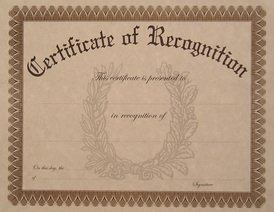Take this quiz, then read on:
According to a recent Gallup Poll, what percentage of the American workforce received no praise or recognition in the last year?
According to the Gallup Corporation's research of five million employees worldwide, the frequency of praise and recognition in the workplace should be no less than:
Researchers have determined for healthy relationships the perfect ratio of positive comments to negative comments is:
Cigarette smoking has been shown to decrease life expectancy by 5.5 years, but a 2000 Mayo Clinic study showed that positive emotion can increase life expectancy by:
The margin that people leave organizations is overwhelming, and it has nothing to do with benefits, pay, or promotion. The main reason is because they feel...

Do you want/need higher employee attainment of customer loyalty? Productivity? Lower employee turnover? Gallup discovered that no less than one time per week of praise and recognition is appropriate. Gallup also indicated that when managers reach this critical step customer loyalty rose 56 percent, productivity rose 38 percent, and employee turnover dropped 50 percent (Smith and Rutigliano, 2003, pg. 119).
In order for workplace relationships to be healthy and holistic, there must be a ration of 5 positive comments to every 1 negative comment. The psychologist, John Gottman, in 1992 studied newly married couples and used the five-to-one ration to predict the success of their marriages. Ten years later John was 94% accurate (Rath and Clifton, 2004, pg. 55).
When I do speaking engagements on "REALationships" I articulate the power of words, they have the power of death and life. Each of us has a checking account that others are making deposits and withdrawals in and out of. There is no password or security on these accounts, anyone of influence, authority or relationship has access to them. It is our jobs to be creating equity in those accounts. How dare any of us ever 'bounce' a check in someone else's emotional account! Listen to this, "Wise leaders are always investing in the equity of the emotional bank account of the people they lead" (Fairley and Zipp, 2008, pg. 61). They see the value added to the individual and the organization as their words build up others, they make this a top priority. If they have made enough deposits they can afford a mistake without bouncing a check.
So how do you give positive Praise? What shouldn't you do in giving praise?
Three Keys to Positive Praise:
- Make it Specific - Don't say, "Great job!" Instead say, "Great job on that report, you went above and beyond what we had expected and made a few leaders very impressed."
- Make it Personalized - Some people like public praise, some like private praise, some like gifts, some like other things. Make it personal to their interests. It would be sad to offer praise and it not be received or embarrassing.
- Make it True - Give praise along the way, not just at the finish line. Be relevant to the task and person. Don't throw praises around indiscriminately, give them where they are due.
Two Don'ts in Delivering Positive Praise:
- Don't follow praise with Correction - If "but" follows praise then it makes you look like one. This makes people anxious when listening to you waiting for the negative and/or correction. This does not create a tone of trust.
- Don't follow praise with a Challenge - Obviously they are doing a good job, they don't need a challenge. The praise isn't going to stop them from doing a good job. Your challenge devalues the worth of the deposits. It is like a tax or bank fee that is not needed.
Coaching Moment:
If living out "REALationships" is a difficult task, depositing value into others is hard, or conflict issues are constant or regular then consider coaching to help you grow through this challenge in life.
Do not be held back in giving praise and recognition, and do not bounce a check in someone else's account.
 RSS Feed
RSS Feed





